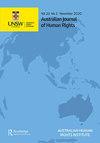Rethinking ‘regional processing’ in Europe: lessons from the Comprehensive Plan of Action (CPA) for indochinese refugees
Q1 Arts and Humanities
引用次数: 0
Abstract
ABSTRACT Since the Syrian refugee crisis in 2015–2016, debate has persisted over the creation of more accessible legal pathways for asylum seekers to reach Europe, particularly during large-scale and protracted refugee situations. This has included the possibility of the European Union processing the protection claims of asylum seekers in transit countries or regions of origin before they reach Europe. Assuming that such arrangements are made without prejudice to the right to claim territorial asylum in Europe or elsewhere, in theory, regional processing could help reduce the risks associated with the onward movement of asylum seekers and migrants and facilitate more predictable movements of people during large-scale refugee situations. But what could or should a ‘regional processing’ framework entail for it to be compatible with international human rights law principles? This paper considers this question by drawing practical insights from the Comprehensive Plan of Action for Indochinese Refugees, which was the first international attempt to introduce region-wide processing during the Indochinese refugee crisis in the 1970s–1980s. Through an evaluation of the Plan, this paper explores how ‘regional processing’ might be re-conceptualised to expand protection pathways to Europe and inform a protection-orientated approach to international cooperation on asylum and migration.自2015-2016年叙利亚难民危机以来,关于为寻求庇护者创造更便利的合法途径进入欧洲的争论一直在持续,特别是在大规模和旷日持久的难民局势中。这包括欧洲联盟可能在寻求庇护者抵达欧洲之前处理他们在过境国或原籍地区提出的保护要求。假设作出这种安排时不损害在欧洲或其他地方要求领土庇护的权利,理论上,区域处理可以帮助减少与寻求庇护者和移徙者继续流动有关的风险,并在大规模难民情况下促进更可预测的人员流动。但是,“区域处理”框架能够或应该具备哪些条件,才能使其与国际人权法原则相一致?通过对该计划的评估,本文探讨了如何重新定义“区域处理”,以扩大通往欧洲的保护途径,并为庇护和移民方面的国际合作提供以保护为导向的方法。
本文章由计算机程序翻译,如有差异,请以英文原文为准。
求助全文
约1分钟内获得全文
求助全文
来源期刊

Australian Journal of Human Rights
Arts and Humanities-History
CiteScore
1.30
自引率
0.00%
发文量
43
期刊介绍:
The Australian Journal of Human Rights (AJHR) is Australia’s first peer reviewed journal devoted exclusively to human rights development in Australia, the Asia-Pacific region and internationally. The journal aims to raise awareness of human rights issues in Australia and the Asia-Pacific region by providing a forum for scholarship and discussion. The AJHR examines legal aspects of human rights, along with associated philosophical, historical, economic and political considerations, across a range of issues, including aboriginal ownership of land, racial discrimination and vilification, human rights in the criminal justice system, children’s rights, homelessness, immigration, asylum and detention, corporate accountability, disability standards and free speech.
 求助内容:
求助内容: 应助结果提醒方式:
应助结果提醒方式:


